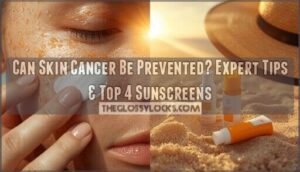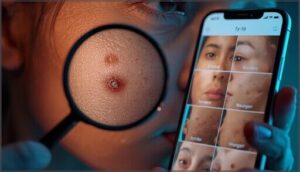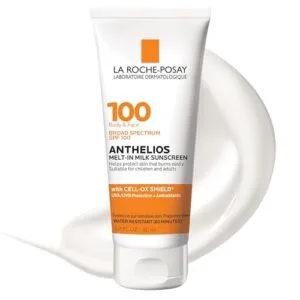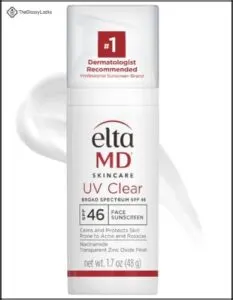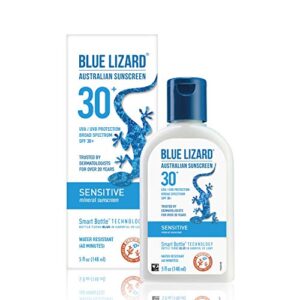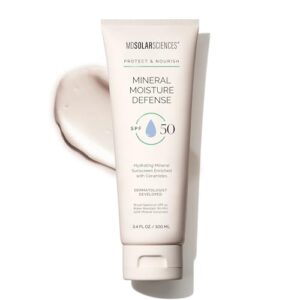This site is supported by our readers. We may earn a commission, at no cost to you, if you purchase through links.
A single blistering sunburn in childhood can double your lifetime risk of melanoma, yet most people don’t apply sunscreen until they’re already at the beach. The question isn’t whether skin cancer can be prevented—research shows that up to 90% of skin cancers are linked to UV exposure, making prevention not just possible but highly effective.
Your daily choices matter more than your genetics here. Sunscreen with SPF 30 or higher blocks about 97% of UVB rays, but only if you’re using enough and reapplying every two hours.
Beyond sunscreen, shade-seeking during peak hours, protective clothing, and monthly skin checks create layers of defense that greatly reduce your risk and catch changes early when treatment works best.
Table Of Contents
- Key Takeaways
- Can Skin Cancer Be Prevented?
- Key Risk Factors for Skin Cancer
- Essential Sun Protection Habits
- Early Detection and Self-Examination Tips
- Lifestyle Choices for Skin Cancer Prevention
- Top 4 Sunscreens for Skin Cancer Prevention
- Frequently Asked Questions (FAQs)
- What can skincare prevent?
- Do we actually need skincare?
- What is preventative skin care?
- Can skin cancer be prevented?
- What are some of the basic skincare tips to prevent acne?
- What is good skin care & why is it important?
- How do I take care of my Skin?
- How can I reduce my skin cancer risk?
- Is skin cancer treatable?
- How can we prevent skin care?
- Conclusion
Key Takeaways
- A single blistering sunburn in childhood doubles your lifetime melanoma risk, yet up to 90% of skin cancers link directly to UV exposure—making consistent sun protection your most powerful defense.
- Daily broad-spectrum sunscreen with SPF 30 or higher blocks about 97% of UVB rays, but you need to apply one ounce for your whole body and reapply every two hours to maintain that protection.
- Monthly self-skin checks catch new or changing moles early when treatment works best—look for asymmetry, irregular borders, or spots that evolve in size, shape, or color.
- Your daily habits matter more than genetics here—combining sunscreen, shade-seeking during peak UV hours (10 a.m. to 4 p.m.), protective clothing, and avoiding tanning beds can reduce your cumulative UV exposure by up to 80% over time.
Can Skin Cancer Be Prevented?
Skin cancer prevention means taking specific steps to lower your risk of developing abnormal skin cell growth, though it’s not a guarantee.
Following evidence-based strategies for how to prevent skin cancer can significantly reduce your exposure to harmful UV radiation and protect your skin long-term.
The goal is to reduce exposure to ultraviolet radiation and other risk factors while strengthening your body’s natural defenses. Understanding what prevention can—and can’t—accomplish helps you make informed choices about protecting your skin.
What Skin Cancer Prevention Means
Skin cancer prevention means actively reducing your exposure to ultraviolet radiation from the sun and artificial sources like tanning beds. It’s about building daily protective habits—applying broad-spectrum sunscreen with SPF 30 or higher, wearing sun-protective clothing, and seeking shade during peak UV hours.
Prevention also includes regular skin checks to catch new or changing lesions early, when treatment works best. These healthy habits substantially lower your cancer risk. Learning about the different types of skin cancer can help you recognize warning signs early and make informed prevention choices.
Limitations of Prevention Efforts
Even with consistent sunscreen and UV radiation avoidance, biological barriers mean skin cancer prevention can’t eliminate all risk. Your genetic makeup, age-related skin repair decline, and environmental factors create a baseline you can’t fully control.
Technological limits in screening access and economic constraints on protective products add social obstacles that reduce real-world effectiveness. Prevention strategies work best when you understand these limits and commit to what’s within your reach.
A broader look at public health highlights how prevention research challenges can limit the effectiveness of strategies across populations.
Key Risk Factors for Skin Cancer
Understanding your personal risk factors is the first step toward meaningful protection.
Some factors, like UV exposure, you can control, while others, such as genetics, are part of your biological blueprint.
Here’s what dermatologists consider when evaluating your skin cancer risk.
UV Exposure and Sunburn History
Your history with the sun matters more than you might think. Sunburn results from UVB radiation exposure, causing redness that usually resolves within 24 to 72 hours, but repeated burns stack up over time.
The following factors contribute to the risks associated with sun exposure:
- Childhood burns increase melanoma risk later in life
- Cumulative UV damage accelerates skin aging and future burn risk
- High-altitude or reflective surfaces (snow, water) intensify UV exposure and sunburn risk
Consistent sun protection through broad-spectrum sunscreen and protective clothing substantially reduces burn severity.
Skin Type and Ethnicity
Your natural skin tone shapes your melanoma risk, though no ethnicity is immune. Lighter complexions have less baseline melanin protection, raising burn susceptibility.
Yet darker skin tones face unique challenges—hyperpigmentation risk after injury, varied acne texture differences, and distinct sensitivity profiles mean ethnic skin variations require customized sun protection. Understanding your skin barrier function and specific vulnerabilities enables smarter skin health choices for effective skin cancer prevention.
Family History and Genetics
Genetic predisposition matters more than many realize—you inherit not just eye color but DNA repair capacity and melanoma susceptibility. If close relatives developed skin cancer, especially before age 50, your risk climbs substantially.
Just as you protect your genetic predispositions with sunscreen, safeguard color-treated strands from UV damage using sulfate-free shampoos designed for color longevity.
- Family history across three generations reveals inherited traits and gene mutations that heighten cancer risk
- Hereditary factors can modify how your cells respond to UV radiation damage over time
- Predictive testing helps relatives understand their own risk and tailor prevention strategies accordingly
Immune System Health
Your immune system stands between you and abnormal cell growth, so when white blood cells can’t patrol effectively, UV radiation damage may go unchecked.
Chronic conditions, organ transplant medications, and HIV all weaken adaptive immunity and raise skin cancer risk. Strengthening immune cell function through adequate sleep, balanced nutrition, and stress management acts as one of the protective factors in any cancer prevention strategy.
Essential Sun Protection Habits
Sun protection isn’t complicated, but it does require daily habits. The good news is that a few daily habits can reduce your cumulative UV exposure by up to 80 percent over time.
Here’s what you need to build into your routine.
Daily Sunscreen Use and Application Tips
You need daily sunscreen on exposed skin even indoors or on cloudy days, cutting UV radiation exposure by up to 80 percent over time.
Apply it 15 to 30 minutes before stepping outside so it forms a protective barrier, then reapply every two hours outdoors and immediately after swimming or sweating. Use about one ounce for your whole body and a nickel-sized amount for your face.
Choosing The Right SPF and Broad-Spectrum Formulas
Look for broad-spectrum on your sunscreen label—it shields you from both UVA and UVB radiation, reducing aging and cancer risk. Choose SPF 30 or higher for daily sun protection, and consider mineral options with zinc oxide if you have sensitive skin.
Chemical filters work well under makeup, while water-resistant formulas stay effective for 40 to 80 minutes during swimming or exercise.
Wearing Sun-Protective Clothing and Accessories
Clothing acts as your first line of defense against UV radiation. Choose UPF fabrics with a tight weave—UPF 50+ blocks 98 percent of harmful rays.
Add wide-brim sun hats with at least a three-inch brim to shield your face and neck, wraparound sunglasses for thorough eye protection, and sun sleeves or protective gloves to cover exposed skin during extended outdoor time.
Avoiding Peak Sun Hours
UV radiation peaks between 10 a.m. and 4 p.m., when sun rays strike Earth most directly. Plan morning or evening outdoor activities to dodge this UV window.
Check your local UV index daily—values of 3 or higher demand extra caution. Seek shade under trees or umbrellas, but remember that protective gear and sunscreen remain essential even when you’re not in direct sunlight.
Early Detection and Self-Examination Tips
Catching skin cancer early dramatically improves treatment outcomes, which is why regular self-examination matters as much as sun protection. You don’t need special training to spot changes on your skin—just a consistent routine and a clear understanding of what warrants concern.
Here’s how to monitor your skin effectively and recognize when it’s time to see a professional.
Monitoring for New or Changing Moles
Your skin can change quietly, and spotting those shifts early is your best defense against melanoma and other skin cancer types.
Start with mole mapping—track new growths and any evolution in size, shape, or color. Digital tracking with photos gives you a clear timeline, while dermoscopy analysis by a dermatologist catches what your eye might miss.
If something feels off, don’t wait.
How to Perform Monthly Skin Checks
Set a monthly reminder—consistency is what catches subtle changes. Grab a full-length mirror, handheld mirror, and your phone for photo documentation.
Conduct your self-exam tips routine in three steps:
- Scan head to toe, including scalp, ears, palms, soles, and between toes
- Document with photos for lesion tracking and skin mapping over time
- Note any asymmetry, irregular borders, or evolving spots for dermoscope use by your dermatologist
This habit strengthens melanoma detection and overall skin health and cancer prevention.
When to Consult a Dermatologist
You shouldn’t wait for your annual physical to get dermatologist visits scheduled. If a mole changes in size, shape, or color—or if you spot irregular borders—book an appointment promptly for mole evaluation.
Persistent rashes lasting beyond two weeks, sores that won’t heal within four weeks, or any bleeding or crusted skin lesions warrant professional rash diagnosis and dermatology assessment for effective skin health and cancer prevention.
Lifestyle Choices for Skin Cancer Prevention
Beyond sunscreen and shade, your daily habits play a bigger role in skin cancer prevention than you might think. What you eat, drink, and the choices you make about indoor tanning and certain medications can either protect your skin or put it at greater risk.
Here are three lifestyle factors that deserve your attention.
Healthy Diet and Skin Health
You can’t eat your way out of sun damage, but a nutrient-rich diet strengthens your skin from the inside. Supporting Skin Cancer Prevention through smart food choices bolsters your overall Skin Health and Care routine—Dermatology research confirms it.
Focus on these five essentials:
- Fiber Benefits: 25–38 grams daily promotes gut balance that reduces inflammation affecting your skin.
- Omega-3s: Two servings of fatty fish weekly improve hydration and suppleness.
- Antioxidant Foods: Berries and leafy greens protect cells from oxidative stress.
- Hydration: 2–3 liters of water daily maintains elasticity and barrier function.
- Vitamin C: Citrus and kiwis boost collagen for firmer texture.
These choices won’t replace sunscreen, but they complement your Cancer Prevention strategy beautifully.
Managing Medications and Sun Sensitivity
Certain medications—antibiotics, diuretics, nonsteroidal anti-inflammatory drugs—exacerbate Photosensitivity Risks and Skin Reactions when UV Radiation hits your skin. If you’re on doxycycline or acne treatments, stricter Sun Protection becomes essential.
Apply broad-spectrum Sunscreen Formulas with SPF 30+ daily, reapply every two hours, and wear protective clothing during peak hours. These Protective Factors strengthen your Skin Cancer Prevention plan while you manage Medication Interactions safely under UV Protection guidelines.
Avoiding Tanning Beds and Excessive Alcohol
Indoor tanning beds flood your skin with UV Radiation that triggers Skin Damage and multiplies Tanning Bed Risks—using them before 35 raises melanoma odds by 75 percent.
Indoor tanning before age 35 raises melanoma risk by 75 percent through concentrated UV radiation damage
Meanwhile, Alcohol Abuse dehydrates skin and disrupts overnight repair. Replace indoor UV sessions with self-tanners, apply Sunscreen daily, and moderate drinking to build Healthy Habits that reinforce your Skin Cancer Prevention strategy and reduce key Risk Factors.
Top 4 Sunscreens for Skin Cancer Prevention
Choosing the right sunscreen isn’t about grabbing whatever’s on sale—it’s about finding a sunscreen formula that you’ll actually use every single day.
The best sunscreens for cancer prevention offer broad-spectrum protection at SPF 30 or higher, but they also need to feel good on your skin so you don’t skip application. Here are four dermatologist-recommended options that balance effective UV protection with wearable textures.
1. La Roche Posay Sunscreen Lotion
La Roche-Posay Anthelios Melt-In Milk Sunscreen SPF 60 offers broad-spectrum protection with a velvety, non-greasy finish that won’t clog your pores. The formula uses Cell-Ox Shield technology, combining chemical filters with antioxidants like vitamin E to defend against free radicals and UV damage.
It’s water-resistant for 80 minutes, making it practical for outdoor activities, and it absorbs quickly without leaving a white cast on most skin tones. If you have sensitive skin, rosacea, or acne-prone skin, this fragrance-free option provides reliable daily protection under makeup or alone.
| Best For | People with sensitive or acne-prone skin who need high SPF protection that won’t feel heavy or leave a white cast. |
|---|---|
| SPF Level | SPF 100 |
| Water Resistance | 80 minutes |
| Fragrance | Unscented |
| Skin Type | Sensitive skin |
| Weight/Size | 4.16 oz |
| Mineral/Chemical | Chemical-free formula |
| Additional Features |
|
- SPF 100 provides excellent protection for extended outdoor activities
- Lightweight, non-greasy formula blends easily and works well under makeup
- Free from oxybenzone and octinoxate, making it reef-friendly and gentler on sensitive skin
- May cause eye irritation in some users
- Not suitable for young children under 3 years old
- Requires frequent reapplication every 80 minutes or after swimming for continued effectiveness
2. EltaMD UV Clear Sunscreen
EltaMD UV Clear Sunscreen SPF 46 delivers mineral protection with 9 percent zinc oxide, paired with 5 percent niacinamide to help calm breakouts and even out skin tone. The oil-free formula absorbs quickly without clogging pores, and it won’t leave a white cast on most complexions.
If you’re managing acne, rosacea, or hyperpigmentation, this dermatologist favorite provides broad-spectrum defense while supporting clearer skin. It layers well under makeup and comes in tinted versions for deeper skin tones.
| Best For | People with acne-prone, sensitive, or hyperpigmented skin who want a lightweight mineral sunscreen that won’t trigger breakouts or leave a heavy white cast. |
|---|---|
| SPF Level | SPF 46 |
| Water Resistance | Not specified |
| Fragrance | Fragrance-free |
| Skin Type | Sensitive, acne-prone |
| Weight/Size | 1.7 oz |
| Mineral/Chemical | Zinc Oxide mineral |
| Additional Features |
|
- Niacinamide helps calm inflammation and fade dark spots while you’re getting sun protection
- Oil-free formula won’t clog pores and works great under makeup
- Zinc oxide gives you solid broad-spectrum coverage without feeling heavy
- Price point is higher than most drugstore sunscreens
- The 1.7 oz bottle runs out pretty quickly with daily use
- Some people still notice a slight white cast depending on their skin tone
3. Blue Lizard Mineral Sunscreen
Blue Lizard Mineral Sunscreen SPF 50 uses zinc oxide and titanium dioxide to create a physical barrier against UVA and UVB rays, and it’s reef-safe without oxybenzone or octinoxate. If you have sensitive skin, you’ll appreciate the fragrance-free, paraben-free formula with aloe vera that stays water-resistant for 80 minutes.
The smart cap changes color when UV light hits it, so you’ll know when protection matters most. Newer sheer formulas rub in without leaving a white cast on many skin tones, though some variants may still show residue.
| Best For | People with sensitive skin who want mineral-based, reef-safe sun protection that’s gentle enough for kids and works well during water activities. |
|---|---|
| SPF Level | SPF 50 |
| Water Resistance | 40 minutes |
| Fragrance | Unscented |
| Skin Type | Sensitive skin |
| Weight/Size | 5 oz |
| Mineral/Chemical | Mineral Zinc Oxide |
| Additional Features |
|
- Physical mineral barrier with zinc oxide provides broad-spectrum protection without harsh chemicals or fragrances
- Smart cap technology alerts you to harmful UV exposure by changing color
- Water-resistant for 80 minutes and includes soothing aloe vera for sensitive skin
- Leaves a white cast on skin that may not fully blend in, depending on the formula variant
- Can cause eye irritation if it runs when wet, making it less ideal for facial use
- Smaller bottle size and higher price point compared to some alternatives
4. MDSolarSciences Mineral Sunscreen Cream
MDSolarSciences Mineral Creme SPF 50 blends zinc oxide and titanium dioxide in a weightless formula that doubles as a makeup primer, so you’re protecting your skin while simplifying your routine.
The matte finish minimizes shine without clogging pores, and antioxidants like vitamin C, green tea, and pomegranate extracts help defend against free radical damage. You’ll need to shake the tube before each use and reapply every two hours, but the fragrance-free formula works well on sensitive skin without leaving a heavy white cast.
| Best For | People with sensitive or acne-prone skin who want reliable sun protection that works under makeup without feeling heavy or greasy. |
|---|---|
| SPF Level | SPF 50 |
| Water Resistance | 80 minutes |
| Fragrance | Fragrance-free |
| Skin Type | Sensitive skin |
| Weight/Size | 3.4 oz |
| Mineral/Chemical | Zinc Oxide, Titanium Dioxide |
| Additional Features |
|
- Doubles as a makeup primer with a matte finish that controls shine
- Packed with antioxidants like vitamin C and green tea to fight skin damage
- Fragrance-free and gentle enough for rosacea-prone skin
- Needs shaking before use and the formula can separate in the tube
- Pricey at $46 for 4 oz compared to drugstore options
- Requires reapplication every 2 hours, which can disrupt makeup
Frequently Asked Questions (FAQs)
What can skincare prevent?
Think of your skincare routine as your skin’s daily armor. Regular sunscreen use blocks UV rays that cause about 80 percent of skin cancer cases when used consistently over time.
Do we actually need skincare?
Yes, you need skincare—especially sunscreen. Daily broad-spectrum SPF prevents UV damage that leads to skin cancer and photoaging, while moisturizers maintain your skin’s protective barrier against environmental stressors.
What is preventative skin care?
Preventative skin care is your skin’s first line of defense—protecting it from daily damage before trouble starts.
You’ll use daily sunscreen, gentle moisturizers, and antioxidant serums to maintain barrier health and reduce aging.
Can skin cancer be prevented?
You can lower your risk of skin cancer substantially through daily sun protection, regular skin checks, and smart lifestyle choices, but no strategy eliminates risk completely.
What are some of the basic skincare tips to prevent acne?
Cleanse your skin twice daily with a gentle formula, apply a noncomedogenic moisturizer.
Don’t pick blemishes, and remove all makeup before bed to keep pores clear, and wear broad-spectrum sunscreen every morning.
What is good skin care & why is it important?
Good skin care means cleansing, moisturizing, and protecting your skin daily. It keeps your barrier strong, prevents irritation and breakouts, and shields you from UV damage that accelerates aging and cancer risk.
How do I take care of my Skin?
Start with a gentle cleanser twice daily, then apply a fragrance-free moisturizer within three minutes.
Don’t skip broad-spectrum SPF 30 sunscreen every morning, even indoors—it’s your most powerful defense against UV damage.
How can I reduce my skin cancer risk?
You can slash your skin cancer risk by wearing SPF 30 daily, seeking shade between 10 a.m. and 4 p.m., and checking your skin monthly for new or changing spots.
Is skin cancer treatable?
Yes, skin cancer is highly treatable when caught early.
Basal and squamous cell carcinomas often heal completely with simple removal, while melanoma responds well to surgery, immunotherapy, or targeted treatments depending on stage.
How can we prevent skin care?
An ounce of prevention beats a pound of cure. You can lower your risk by wearing broad-spectrum SPF 30 sunscreen daily, seeking shade during peak hours, and avoiding tanning beds altogether.
Conclusion
Think of sun protection like brushing your teeth—it’s most effective when it becomes automatic, not an afterthought.
Can skin cancer be prevented? The evidence says yes, when you layer daily sunscreen, protective clothing, and vigilant skin checks into your routine.
Your skin remembers every unprotected exposure, but it also rewards consistency. Start with one habit today, then build. Small, repeated actions create the armor your skin needs for decades ahead.

